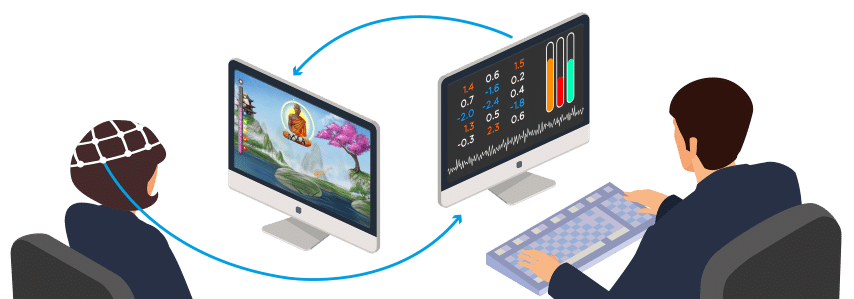Apps, Virtual Reality and More: Technological Trends Shaping the Future of Mental Healthcare
Epidemics and pandemics propagate fear and erratic behavior, and the effects of it remain in the human psyche long after they are over. COVID-19, for example, has had an enormous psychological impact on people’s collective consciousness.
COVID-19 has led to various mental health issues which are essentially anxiety stemming from uncertainty because of stress from traumatic experiences, like job losses and business closures, as well as depression because of isolation.
A similar mental healthcare situation surfaced during the Spanish Flu pandemic of 1918. The survivors of the pandemic reported sleep disturbances, depression, mental distraction, dizziness, and difficulty in coping with work.
A study by Mamelund in a Norway asylum found that mental disorders attributed to influenza increased by an average annual factor of 7.2 in the six years following the pandemic. This indicates the mental health implications of a pandemic long after it is gone.
These past and current global pandemic experiences make understanding human behavior and emotional responses all the more important to develop strategies for effectively dealing with them. These can also help provide insights into the types of services we can offer. For example, in times of social distancing, to what extent will in-person therapy or group therapy be possible?
The Rise of Tele-healthcare
With the emergence of tele-healthcare during the height of the COVID-19 pandemic, remote medical help can now be easily provided.
Telehealth services have actually gained popularity because of the convenience they offer and the way they are designed to ensure social distancing. In fact, it continues to grow and it is estimated that tele-healthcare will be worth close to $20 billion in 2025.
According to a recent study, about 80% of Americans use the Internet to get mental health information and find it to be more convenient. The global health crisis has actually given healthcare a chance to step up and provide therapy and support with the help of technology.
During the Spanish Flu, counseling and therapy were at a rudimentary stage. But it’s a completely different picture in 2021.
Technology has opened a new frontier in mental healthcare in terms of providing the necessary support.
Mobile devices like cell phones, smartphones, and tablets are enabling experts to adopt new ways of providing access to help, monitor progress, and increase one’s understanding of mental wellbeing. Mobile mental health support has proven to be very simple but effective. For example, anyone with the ability to send a text message can contact a crisis center.
Now, let’s dive deeper and take a look at a few technological innovations whose importance may have been emphasized with the advent of the pandemic. We’ll also discuss those that may even find a permanent place in the workings of the mental healthcare industry of the future.
Primary Evaluations and Assessments
Besides therapy, an equally important aspect of psychological intervention is primary assessment and evaluation. Internet-based psychological assessments, as the name suggests, use an online medium in place of paper-and-pencil tests.
Upon completion of any test, respondents typically have their results generated with the simple click of a button. These results are transmitted to a psychologist or are automatically scored and some form of feedback is presented. Although several assessments are already available, we can still streamline their use and standardize these to make the process of primary evaluation, test-taking and feedback easier.
Through the use of technology, several types of tests, such as personality inventories, career-interest questionnaires, or intellectual ability tests, can yield immediate, accurate results. The benefits provided by such high-tech assessments include quick and reliable results, easy facilitation, and freedom from the assessor’s biases.

Tele-therapy and E-Therapy Services
Tele-therapy and e-therapy services are gaining wide popularity for providing support to individuals in need.
Several hospitals and mental healthcare centers have already started offering counseling via phone and video calls. A suicide prevention helpline is one successful example of tele-healthcare designed to help individuals all over the world who are at risk of suicide.
Some studies also show the effectiveness of implementing different therapies through online mediums. A study by Andrews, et al. (2018) shows the acceptability of online cognitive behavioral therapy along with its effectiveness as a treatment for major depression, panic disorder, social anxiety disorder, and generalized anxiety disorder.

The Role of Applications
With over 2.7 billion smartphone users across the world, there has been a boost in app development. There are several mental health apps available in app stores, and the number is growing each year.
Apps such as Talkspace allow you to exchange messages with a licensed therapist. Based on your preferred therapy, a therapist is assigned to you and you can send a text, audio, or video message from anywhere, anytime. Also, the app comprises features to set goals, gain insights, and monitor progress.
Several self-help apps, such as Headspace and Calm, that comprise guided meditation and stretching exercises, help ease stress and anxiety and improve sleep.
While these apps can provide a certain degree of support and quick boost to elevate or maintain your moods, keep in mind that there is very little industry regulation on them. There is not enough data available on the effectiveness of each app, which means these self-help apps should not replace professional care.
Latest Technology in the Market
Besides remote counseling and psychotherapy, neurofeedback training is gaining popularity.
Neurofeedback is a therapeutic intervention that provides immediate feedback from a computer-based program that measures a client’s brainwave activity in real-time to facilitate self-regulation. It has been increasingly used not just for the purpose of improving mental wellness, but also for improving overall emotional and physical well-being.
Being non-invasive, it provides a safe mode of treatment with no major side effects. With this form of training reaching the mainstream market, remote neurofeedback devices may be widely used.
Neurofeedback therapy can also be easily carried out in the comfort of your home using specially designed electroencephalogram (EEG) devices, along with remote supervision by clinical experts.

As for devices already in use, here are a few other technological innovations that are currently available in the market:
- Headbands: Headbands are used to improve your focus and calm your mind with a personalized training program designed by a clinical expert. This device uses advanced signal processing to interpret your mental activity and provides audio feedback. For example, when your mind is calm and settled, you hear a peaceful sound, and as your focus drifts away, it creates an unpleasant sound to bring back your attention.
- Light and sound machines: These are a combination of the headset, eyewear, and screen that uses audio-visual entertainment (AVE) and cranio-electro stimulation (CES) to help you reach optimal levels of well-being. This guides you through various brainwave states, which can help with things such as increasing neurotransmitter production and cerebral blood flow.
- Eyewear: With a backlit, colored LCD display, eyewear devices comprise a color organ feature that turns the preinstalled ambient sounds and electronic music (as well as any music of your choice) into a colorful light show. This helps train the brain in different ways and access deeply tranquil states.
- Virtual reality: VR technology can soon be used to diagnose and treat mental health conditions ranging from anxiety, phobias, chronic pain to Alzheimer’s disease. The immersive, interactive, and three-dimensional simulations can also be used for exposure therapy, which is a form of behavioral therapy that puts the patient in virtually real-world situations. According to research, this exposure therapy leads to better treatment outcomes, as it is created in a safe and controlled environment that allows the therapist to regulate the intensity of their patients’ experience. Since VR technology can provide more personalized therapeutics in mental healthcare, it may replace a few traditional forms of therapy in the future.

Affordable and Accessible Alternative Approaches to Mental Healthcare
People now prefer healthcare that is convenient, low cost, and accessible, while also being safe, efficient, and effective.
The pandemic has forced the healthcare industry into exploring alternative approaches in dealing with healthcare, especially mental health services. This has led to several companies investing time and energy towards the development of new technology or software to improve mental healthcare facilities across the globe.
The aforementioned mental healthcare services and technology require skilled workers from several professions, ranging from researchers to engineers and more. These specialists joining forces with healthcare professionals and health administrators can ensure feasible infrastructure for the deliverance of effective alternative treatment options.
People-Centered Care Will Always Matter
Ultimately, what is most crucial is the fact that we serve people: patients or clients (our customers). There is no denying that technology has proven to be an extraordinary help in providing care during difficult times. However, several precautions need to be taken to safeguard client rights and ensure feasibility and quality of care.
Furthermore, compliance with industry guidelines and standardizations needs to be strictly monitored to ensure optimal mental healthcare. It is equally important for customers to educate themselves about the various options available in the market.
Another responsibility of the healthcare industry is to aid customers through health awareness plans, initiatives, incentives, and provide access to decision-making tools to encourage responsible and informed healthcare delivery.
The future will increasingly rely on technology for innovation and growth. Among such several innovations, virtual mental healthcare will see a steep increase in its demand for all age demographics.
With the ease of access and affordability it provides, tele-therapy could prove to be a lifesaver. However, further studies need to be conducted through research and clinical trials to look into new ways to detect, prevent, and treat mental health ailments in the future.

Dr. Upasana Gala is the founder and CEO of Evolve Brain Training, a Neurofeedback-centered institute that focuses on using non-invasive brain training techniques to maximize the brain's true potential.

